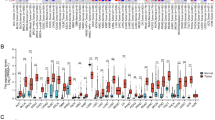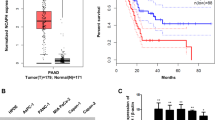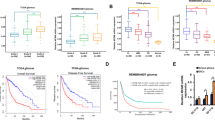Abstract
Minichromosome maintenance (MCM) proteins 2–7 are important in DNA replication licensing. Functional roles beyond licensing are speculated. In addition, significances in medulloblastoma (MB) remain unclear. In this study, we showed the frequent deregulation of MCM2 and MCM3 expression in 7 MB cell lines and 31 clinical samples. Moreover, DAOY and ONS76 and the clinical samples expressed elevated MCM7 transcripts with genomic gain of the gene. Immunopositivity restricted to tumor cells was found in 41, 37 and 53 out of 73 MB cases for MCM2, MCM3 and MCM7, respectively. High-MCM3 expression was associated with poor prognosis. Knockdowns of these MCMs significantly inhibited anchorage-dependent and -independent MB cell growth. The inhibition of MCM3 expression by small interfering RNA knockdown was related to G1 arrest with reduced cyclin A expression, whereas the MCM2- and MCM7-knocked-down cells arrested at G2/M with increased cyclin A expression. Interestingly, we demonstrated the links of these MCMs with cell migration and invasion using wound-healing and Transwell migration/invasion assays. Exogenous overexpression of MCM2, MCM3 and MCM7 increased anchorage-independent cell growth, and also cell migration and invasion capabilities in MB cells. The knockdown reduced the number of filopodial cells and the cells with intense stress fibers by blocking cdc42 and Rho activation. Taken together, deregulation of MCM2, MCM3 and MCM7 expression might be involved in MB tumorigenesis and we revealed undefined roles of these MCMs in control of MB cell migration and invasion.
This is a preview of subscription content, access via your institution
Access options
Subscribe to this journal
Receive 50 print issues and online access
$259.00 per year
only $5.18 per issue
Buy this article
- Purchase on Springer Link
- Instant access to full article PDF
Prices may be subject to local taxes which are calculated during checkout







Similar content being viewed by others
References
Avet-Loiseau H, Vénuat AM, Terrier-Lacombe MJ, Lellouch-Tubiana A, Zerah M, Vassal G . (1999). Comparative genomic hybridization detects many recurrent imbalances in central nervous system primitive neuroectodermal tumours in children. Br J Cancer 79: 1843–1847.
Bailis JM, Forsburg SL . (2004). MCM proteins: DNA damage, mutagenesis and repair. Curr Opin Genet Dev 14: 17–21.
Bayani J, Zielenska M, Marrano P, Kwan Ng Y, Taylor MD, Jay V et al. (2000). Molecular cytogenetic analysis of medulloblastomas and supratentorial primitive neuroectodermal tumors by using conventional banding, comparative genomic hybridization, and spectral karyotyping. J Neurosurg 93: 437–448.
Blow JJ, Gillespie PJ . (2008). Replication licensing and cancer--a fatal entanglement? Nat Rev Cancer 8: 799–806.
Burkhart R, Schulte D, Hu D, Musahl C, Göhring F, Knippers R . (1995). Interactions of human nuclear proteins P1Mcm3 and P1Cdc46. Eur J Biochem 228: 431–438.
Cortez D, Glick G, Elledge SJ . (2004). Minichromosome maintenance proteins are direct targets of the ATM and ATR checkpoint kinases. Proc Natl Acad Sci USA 101: 10078–10083.
Crevel G, Hashimoto R, Vass S, Sherkow J, Yamaguchi M, Heck MM et al. (2007). Differential requirements for MCM proteins in DNA replication in Drosophila S2 cells. PLoS One 2: e833.
DaFonseca CJ, Shu F, Zhang JJ . (2001). Identification of two residues in MCM5 critical for the assembly of MCM complexes and Stat1-mediated transcription activation in response to IFN-gamma. Proc Natl Acad Sci USA 98: 3034–3049.
De Bortoli M, Castellino RC, Lu XY, Deyo J, Sturla LM, Adesina AM et al. (2006). Medulloblastoma outcome is adversely associated with overexpression of EEF1D, RPL30, and RPS20 on the long arm of chromosome 8. BMC Cancer 6: 223.
Dudderidge TJ, McCracken SR, Loddo M, Fanshawe TR, Kelly JD, Neal DE et al. (2007). Mitogenic growth signalling, DNA replication licensing, and survival are linked in prostate cancer. Br J Cancer 96: 1384–1393.
Dudderidge TJ, Stoeber K, Loddo M, Atkinson G, Fanshawe T, Griffiths DF et al. (2005). Mcm2, Geminin, and KI67 define proliferative state and are prognostic markers in renal cell carcinoma. Clin Cancer Res 11: 2510–2517.
Eberhart CG, Kratz JE, Schuster A, Goldthwaite P, Cohen KJ, Perlman EJ et al. (2002). Comparative genomic hybridization detects an increased number of chromosomal alterations in large cell/anaplastic medulloblastomas. Brain Pathol 12: 36–44.
Endl E, Kausch I, Baack M, Knippers R, Gerdes J, Scholzen T . (2001). The expression of Ki-67, MCM3, and p27 defines distinct subsets of proliferating, resting, and differentiated cells. J Pathol 195: 457–462.
Feng D, Tu Z, Wu W, Liang C . (2003). Inhibiting the expression of DNA replication-initiation proteins induces apoptosis in human cancer cells. Cancer Res 63: 7356–7364.
Fitch MJ, Donato JJ, Tye BK . (2003). Mcm7, a subunit of the presumptive MCM helicase, modulates its own expression in conjunction with Mcm1. J Biol Chem 278: 25408–25416.
Forsburg SL . (2004). Eukaryotic MCM proteins: beyond replication initiation. Microbiol Mol Biol Rev 68: 109–131.
Freeman A, Morris LS, Mills AD, Stoeber K, Laskey RA, Williams GH et al. (1999). Minichromosome maintenance proteins as biological markers of dysplasia and malignancy. Clin Cancer Res 5: 2121–2132.
Giangaspero F, Bigner SH, Kleihues P, Pietsch T, Trojanowshi JQ . (2000). Medulloblastoma. In: Kleihues P, Cavenee WK (eds). Pathology and Genetics of Tumors of the Nervous System. IARC Press: Lyon, pp 129–137.
Gilhuis HJ, Anderl KL, Boerman RH, Jeuken JM, James CD, Raffel C et al. (2000). Comparative genomic hybridization of medulloblastomas and clinical relevance: eleven new cases and a review of the literature. Clin Neurol Neurosurg 102: 203–209.
Giordana MT, Schiffer P, Schiffer D . (1998). Prognostic factors in medulloblastoma. Childs Nerv Syst 14: 256–262.
Gonzalez MA, Pinder SE, Callagy G, Vowler SL, Morris LS, Bird K et al. (2003). Minichromosome maintenance protein 2 is a strong independent prognostic marker in breast cancer. J Clin Oncol 21: 4306–4313.
Gonzalez MA, Tachibana KE, Laskey RA, Coleman N . (2005). Control of DNA replication and its potential clinical exploitation. Nat Rev Cancer 5: 135–141.
Ha SA, Shin SM, Namkoong H, Lee H, Cho GW, Hur SY et al. (2004). Cancer-associated expression of minichromosome maintenance 3 gene in several human cancers and its involvement in tumorigenesis. Clin Cancer Res 10: 8386–8395.
Hanna-Morris A, Badvie S, Cohen P, McCullough T, Andreyev HJ, Allen-Mersh TG . (2009). Minichromosome maintenance protein 2 (MCM2) is a stronger discriminator of increased proliferation in mucosa adjacent to colorectal cancer than Ki-67. J Clin Pathol 62: 325–330.
Haverty PM, Weng Z, Best NL, Auerbach KR, Hsiao LL, Jensen RV et al. (2002). HugeIndex: a database with visualization tools for high-density oligonucleotide array data from normal human tissues. Nucleic Acids Res 30: 214–217.
Honeycutt KA, Chen Z, Koster MI, Miers M, Nuchtern J, Hicks J et al. (2006). Deregulated minichromosomal maintenance protein MCM7 contributes to oncogene driven tumorigenesis. Oncogene 25: 4027–4032.
Hui AB, Takano H, Lo KW, Kuo WL, Lam CN, Tong CY et al. (2005). Identification of a novel homozygous deletion region at 6q23.1 in medulloblastomas using high-resolution array comparative genomic hybridization analysis. Clin Cancer Res 11: 4707–4716.
Hyrien O, Marheineke K, Goldar A . (2003). Paradoxes of eukaryotic DNA replication: MCM proteins and the random completion problem. Bioessays 25: 116–125.
Kato H, Miyazaki T, Fukai Y, Nakajima M, Sohda M, Takita J et al. (2003). A new proliferation marker, minichromosome maintenance protein 2, is associated with tumor aggressiveness in esophageal squamous cell carcinoma. J Surg Oncol 84: 24–30.
Ke N, Albers A, Claassen G, Yu DH, Chatterton JE, Hu X et al. (2004). One-week 96-well soft agar growth assay for cancer target validation. Biotechniques 36: 826–833.
Korkolopoulou P, Givalos N, Saetta A, Goudopoulou A, Gakiopoulou H, Thymara I et al. (2005). Minichromosome maintenance proteins 2 and 5 expression in muscle-invasive urothelial cancer: a multivariate survival study including proliferation markers and cell cycle regulators. Hum Pathol 36: 899–907.
Lei M . (2005). The MCM complex: its role in DNA replication and implications for cancer therapy. Curr Cancer Drug Targets 5: 365–380.
Lei M, Kawasaki Y, Tye BK . (1996). Physical interactions among Mcm proteins and effects of Mcm dosage on DNA replication in Saccharomyces cerevisiae. Mol Cell Biol 16: 5081–5090.
Livak KJ, Schmittgen TD . (2001). Analysis of relative gene expression data using real-time quantitative PCR and the 2(-delta delta C(T)) method. Methods 25: 402–408.
Meng MV, Grossfeld GD, Williams GH, Dilworth S, Stoeber K, Mulley TW et al. (2001). Minichromosome maintenance protein 2 expression in prostate: characterization and association with outcome after therapy for cancer. Clin Cancer Res 7: 2712–2718.
Nicholson JC, Ross FM, Kohler JA, Ellison DW . (1999). Comparative genomic hybridization and histological variation in primitive neuroectodermal tumours. Br J Cancer 80: 1322–1331.
Nishihara K, Shomori K, Fujioka S, Tokuyasu N, Inaba A, Osaki M et al. (2008). Minichromosome maintenance protein 7 in colorectal cancer: implication of prognostic significance. Int J Oncol 33: 245–251.
Nishizaki T, Harada K, Kubota H, Ozaki S, Ito H, Sasaki K . (1999). Genetic alterations in pediatric medulloblastomas detected by comparative genomic hybridization. Pediatr Neurosurg 31: 27–32.
Nobes CD, Hall A . (1995). Rho, rac, and cdc42 GTPases regulate the assembly of multimolecular focal complexes associated with actin stress fibers, lamellipodia, and filopodia. Cell 81: 53–62.
Oehlmann M, Score AJ, Blow JJ . (2004). The role of Cdc6 in ensuring complete genome licensing and S phase checkpoint activation. J Cell Biol 165: 181–190.
Polkinghorn WR, Tarbell NJ . (2007). Medulloblastoma: tumorigenesis, current clinical paradigm, and efforts to improve risk stratification. Nat Clin Pract Oncol 4: 295–304.
Ramnath N, Hernandez FJ, Tan DF, Huberman JA, Natarajan N, Beck AF et al. (2001). MCM2 is an independent predictor of survival in patients with non-small-cell lung cancer. J Clin Oncol 19: 4259–4266.
Reardon DA, Michalkiewicz E, Boyett JM, Sublett JE, Entrekin RE, Ragsdale ST et al. (1997). Extensive genomic abnormalities in childhood medulloblastoma by comparative genomic hybridization. Cancer Res 57: 4042–4047.
Ren B, Yu G, Tseng GC, Cieply K, Gavel T, Nelson J et al. (2006). MCM7 amplification and overexpression are associated with prostate cancer progression. Oncogene 25: 1090–1098.
Rodins K, Cheale M, Coleman N, Fox SB . (2002). Minichromosome maintenance protein 2 expression in normal kidney and renal cell carcinomas: relationship to tumor dormancy and potential clinical utility. Clin Cancer Res 8: 1075–1081.
Rossi MR, Conroy J, McQuaid D, Nowak NJ, Rutka JT, Cowell JK . (2006). Array CGH analysis of pediatric medulloblastomas. Genes Chromosomes Cancer 45: 290–303.
Schrader C, Janssen D, Klapper W, Siebmann JU, Meusers P, Brittinger G et al. (2005). Minichromosome maintenance protein 6, a proliferation marker superior to Ki-67 and independent predictor of survival in patients with mantle cell lymphoma. Br J Cancer 93: 939–945.
Scott IS, Morris LS, Rushbrook SM, Bird K, Vowler SL, Burnet NG et al. (2005). Immunohistochemical estimation of cell cycle entry and phase distribution in astrocytomas: applications in diagnostic neuropathology. Neuropathol Appl Neurobiol 31: 455–466.
Shechter D, Gautier J . (2004). MCM proteins and checkpoint kinases get together at the fork. Proc Natl Acad Sci USA 101: 10845–10846.
Stoeber K, Tlsty TD, Happerfield L, Thomas GA, Romanov S, Bobrow L et al. (2001). DNA replication licensing and human cell proliferation. J Cell Sci 114: 2027–2041.
Tachibana KE, Gonzalez MA, Coleman N . (2005). Cell-cycle-dependent regulation of DNA replication and its relevance to cancer pathology. J Pathol 205: 123–129.
Takahashi TS, Wigley DB, Walter JC . (2005). Pumps, paradoxes and ploughshares: mechanism of the MCM2–7 DNA helicase. Trends Biochem Sci 30: 437–444.
Todorov IT, Attaran A, Kearsey SE . (1995). BM28, a human member of the MCM2-3-5 family, is displaced from chromatin during DNA replication. J Cell Biol 129: 1433–1445.
Todorov IT, Pepperkok R, Philipova RN, Kearsey SE, Ansorge W, Werner D . (1994). A human nuclear protein with sequence homology to a family of early S phase proteins is required for entry into S phase and for cell division. J Cell Sci 107: 253–265.
Tong CY, Hui AB, Yin XL, Pang JC, Zhu XL, Poon WS et al. (2004). Detection of oncogene amplifications in medulloblastomas by comparative genomic hybridization and array-based comparative genomic hybridization. J Neurosurg 100: 187–193.
Wharton SB, Chan KK, Anderson JR, Stoeber K, Williams GH . (2001). Replicative Mcm2 protein as a novel proliferation marker in oligodendrogliomas and its relationship to Ki67 labelling index, histological grade and prognosis. Neuropathol Appl Neurobiol 27: 305–313.
Wharton SB, Maltby E, Jellinek DA, Levy D, Atkey N, Hibberd S et al. (2007). Subtypes of oligodendroglioma defined by 1p,19q deletions, differ in the proportion of apoptotic cells but not in replication-licensed non-proliferating cells. Acta Neuropathol 113: 119–127.
Williams GH, Stoeber K . (2007). Cell cycle markers in clinical oncology. Curr Opin Cell Biol 19: 672–679.
Yankulov K, Todorov I, Romanowski P, Licatalosi D, Cilli K, McCracken S et al. (1999). MCM proteins are associated with RNA polymerase II holoenzyme. Mol Cell Biol 19: 6154–6163.
Yu Z, Feng D, Liang C . (2004). Pairwise interactions of the six human MCM protein subunits. J Mol Biol 340: 1197–1206.
Acknowledgements
This work was supported by the Hong Kong Research Grants Council General Research Fund 472307.
Author information
Authors and Affiliations
Corresponding authors
Ethics declarations
Competing interests
The authors declare no conflict of interest.
Additional information
Supplementary Information accompanies the paper on the Oncogene website
Supplementary information
Rights and permissions
About this article
Cite this article
Lau, KM., Chan, Q., Pang, J. et al. Minichromosome maintenance proteins 2, 3 and 7 in medulloblastoma: overexpression and involvement in regulation of cell migration and invasion. Oncogene 29, 5475–5489 (2010). https://doi.org/10.1038/onc.2010.287
Received:
Revised:
Accepted:
Published:
Issue Date:
DOI: https://doi.org/10.1038/onc.2010.287
Keywords
This article is cited by
-
O-GlcNAcylation of YTHDF2 promotes HBV-related hepatocellular carcinoma progression in an N6-methyladenosine-dependent manner
Signal Transduction and Targeted Therapy (2023)
-
MCM2 in human cancer: functions, mechanisms, and clinical significance
Molecular Medicine (2022)
-
ITRAQ-based quantitative proteomic analysis reveals that VPS35 promotes the expression of MCM2-7 genes in HeLa cells
Scientific Reports (2022)
-
Bioinformatics approaches identified dasatinib and bortezomib inhibit the activity of MCM7 protein as a potential treatment against human cancer
Scientific Reports (2022)
-
Transcriptional expression and prognostic roles of MCM7 in human bladder, breast, and lung cancers: a multi-omics analysis
Network Modeling Analysis in Health Informatics and Bioinformatics (2022)



